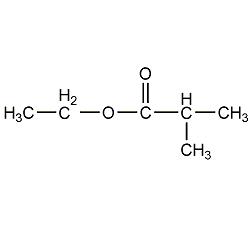
Structural formula
| Business number | 02CF |
|---|---|
| Molecular formula | C6H12O2 |
| Molecular weight | 116.16 |
| label |
2-Methylpropionate, Ethyl 2-methyl propane, (CH3)2CHCOOCH2CH3, spices |
Numbering system
CAS number:97-62-1
MDL number:MFCD00009165
EINECS number:202-595-4
RTECS number:NQ4675000
BRN number:773846
PubChem number:24881085
Physical property data
1. Properties: Colorless and volatile liquid with fruity aroma. [1]
2. Melting point (℃): -88[2]
3. Boiling point (℃): 110.1[3]
4. Relative density (water = 1): 0.87[4]
5. Relative vapor Density (air=1): 4.01[5]
6. Saturated vapor pressure (kPa): 5.33 (33.8℃)[6]
7. Heat of combustion (kJ/mol): -3535.0[7]
8. Critical temperature (℃): 280[8]
9. Critical pressure (MPa): 3.04[9]
10. Octanol/water partition coefficient: 1.77 [10]
11. Flash point (℃): 13[11]
12. Solubility: slightly soluble in water, Soluble in ethanol, ether, etc. [12]
13. Refractive index (n20ºC): 1.3869
14. Solubility parameter (J·cm-3)0.5: 16.504
15. Critical density (g·cm-3): 0.28
16. Critical volume (cm3·mol-1): 415
17. Critical compression factor: 0.279
18. Eccentricity factor: 0.426
19.van der Waals Volume (cm3·mol-1): 73.200
20.van der Waals Area (cm2·mol-1): 1.050×1010
21. Liquid phase standard hot melt ( J·mol-1·K-1):209.8
Toxicological data
1. Acute toxicity[13] LD50: 800mg/kg (mouse vein); 800mg/kg (mouse abdominal cavity)
2. Irritation [14] Rabbit transdermal: 500mg (24h), moderate irritation.
Ecological data
1. Ecotoxicity No data available
2. Biodegradability No data available
3 .Non-biodegradability No data yet
4. Other harmful effects[15] This substance may be harmful to the environment and is harmful to the environment. Bodies of water should be given special attention.
Molecular structure data
1. Molar refractive index: 31.57
2. Molar volume (cm3/mol): 131.4
3. Isotonic specific volume (90.2K ): 292.9
4. Surface tension (dyne/cm): 24.6
5. Dielectric constant:
6. Dipole moment (10-24cm3):
7. Polarizability: 12.51
Compute chemical data
1. Hydrophobic parameter calculation parameters�� value (XlogP): 1.5
2. Number of hydrogen bond donors: 0
3. Number of hydrogen bond acceptors: 2
4. Yes Number of rotational chemical bonds: 3
5. Number of tautomers: None
6. Topological molecule polar surface area 26.3
7. Number of heavy atoms: 8
8. Surface charge: 0
9. Complexity: 76.6
10. Number of isotope atoms: 0
11. Determine the number of atomic stereocenters: 0
12. Uncertain number of atomic stereocenters: 0
13. Determine the number of chemical bond stereocenters: 0
14. Number of uncertain chemical bond stereocenters: 0
15. Number of covalent bond units: 1
Properties and stability
1. Stability[16] Stable
2. Incompatible substances[17] Strong oxidants, strong bases, strong acids
3. Polymerization hazard[18] No polymerization
Storage method
Storage Precautions[19] Stored in a cool, ventilated warehouse. Keep away from fire and heat sources. The storage temperature should not exceed 37℃. Keep container tightly sealed. They should be stored separately from oxidants, acids, and alkalis, and avoid mixed storage. Use explosion-proof lighting and ventilation facilities. It is prohibited to use mechanical equipment and tools that are prone to sparks. The storage area should be equipped with emergency release equipment and suitable containment materials.
Synthesis method
1. Obtained from the esterification of isobutyric acid and absolute ethanol. After mixing isobutyric acid and absolute ethanol, carefully add concentrated sulfuric acid, heat to reflux for 14 hours, wash with water, saturated sodium bicarbonate solution, and water in sequence, dry over anhydrous magnesium sulfate, distill, and collect 109-111°C Fraction, 2-methylpropionic acid ethyl ester was obtained with a yield of 69%.
2. It is obtained by heating esterification of isobutyric acid and ethanol under azeotropic conditions and then distilling it.
Purpose
Used in organic synthesis, essence extraction, etc. [20]
extended-reading:https://www.bdmaee.net/wp-content/uploads/2022/08/-33-LX–33-LX-catalyst-tertiary-amine-catalyst-33-LX.pdfextended-reading:https://www.bdmaee.net/fomrez-ul-28-catalyst-dimethyltin-dioctadecanoate-momentive-2/extended-reading:https://www.newtopchem.com/archives/927extended-reading:https://www.newtopchem.com/archives/44551extended-reading:https://www.bdmaee.net/wp-content/uploads/2022/08/stannous-octoate-CAS-301-10-0–T-9.pdfextended-reading:https://www.morpholine.org/teda-l33b-dabco-polycat-gel-catalyst/extended-reading:https://www.cyclohexylamine.net/polyurethane-monosodium-glutamate-self-skinning-pinhole-elimination-agent/extended-reading:https://www.newtopchem.com/archives/39408extended-reading:https://www.bdmaee.net/catalyst-pt303/extended-reading:https://www.newtopchem.com/archives/1850


